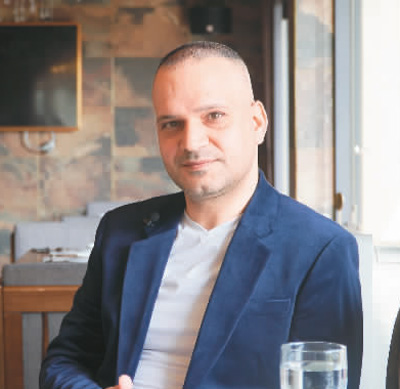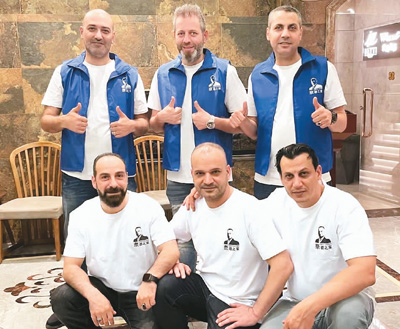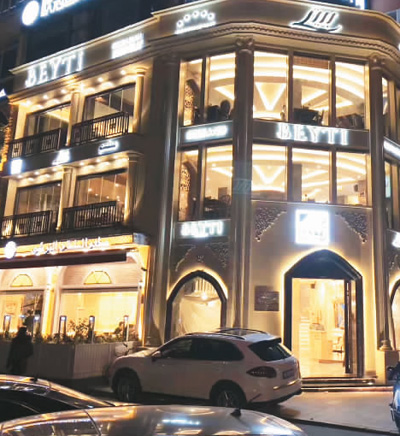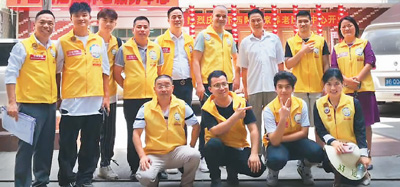Jordanian man’s entrepreneurial dream comes true in China’s Yiwu
A Jordanian man has become a successful entrepreneur in Yiwu in east China’s Zhejiang province, which is known for harboring the world’s largest small commodity wholesale market.

Photo shows Mohanad Shalabi. (Photo courtesy of the interviewee)
Mohanad Shalabi came to China to seek work 21 years ago. At first, he labored at an Arabic restaurant operated by his uncle in south China’s Guangdong province, where he met and married his wife Liu Fang from east China’s Anhui province.
“My dream was to start my own business. I always believed that I have a business brain,” Shalabi said, adding that he was convinced that he would succeed because China offers equal opportunities for foreign entrepreneurs.
In 2002, Shalabi learned that many Arab merchants were flocking to Yiwu, but there were relatively few Arabic restaurants in the city. Seizing the opportunity, the couple began to run their own Arabic restaurant that year named “Ward”, which means “rose” in Arabic and symbolizes happiness and peace, at north Chouzhou road in Yiwu.

Photo show Mohanad Shalabi (front-center) and other members of his studio being used for public welfare activities. (Photo courtesy of the interviewee)
During that time, shortly after China’s entry into the World Trade Organization, Yiwu was on its way to developing itself into the world’s largest small commodity market, attracting more and more foreign merchants.
As one of the few Arabic restaurants in Yiwu, Shalabi’s business managed to garner a good reputation and received a surging number of foreign merchants as customers.
In 2014, Chinese President Xi Jinping mentioned Shalabi’s story about realizing his entrepreneurial dream in China at the opening ceremony of the Sixth Ministerial Conference of the China-Arab States Cooperation Forum in Beijing. Thanks to President Xi’s praise, the couple’s business began to flourish even more.
Shalabi moved his restaurant into a building located closer to Yiwu’s International Trade Mart in 2018, and renamed it “Beyti”, which means “my home.” In the three-story restaurant, he has hired 10 chefs and has been updating the menu and improving services. “I want to make everyone feel at home,” he said.
Shalabi has come a long way from being a migrant worker to being a successful entrepreneur recognized by President Xi, which can be attributed partly to the Yiwu municipal government’s efforts to help foreign merchants. During this process, the man has also witnessed the rapid development of China’s Yiwu.

Photo shows Mohanad Shalabi’s restaurant called “Beyti”. (Photo courtesy of the interviewee)
In 2012, the local government set up a one-stop international trade service center to handle all foreign-related businesses to greatly improve the efficiency of governing these entities. A few years later, the local government adopted Shalabi’s advice to issue foreign merchant cards to foreign businessmen in the city. The card serves the same functions of a foreigner’s passport, and holders of the card can enjoy the same benefits that local citizens have in terms of pensions, healthcare, children’s education, and other social benefits.
As a result, around 15,000 foreign traders from more than 100 countries and regions are now stationed in Yiwu, and over 550,000 foreigners come to the city to purchase commodities every year.
Shalabi will make purchases of materials for his restaurant every other week, such as olive oil, at the Yiwu China imported commodities mall in the city. “In the past, when my restaurant needed some imported commodities, I had to ask my overseas friends to bring them over or buy them from big cities such as Shanghai and Guangzhou. Now, I can buy them at affordable prices in Yiwu,” he said. At present, the city has more than 2.1 million kinds of commodities for purchase.
Meanwhile, Shalabi’s family is flourishing too, with two sons born in Yiwu who now attend local schools. Having bought an apartment in the city, he plans to live here permanently.
“Now that I can realize my dream in Yiwu, I will take root in the city,” Shalabi said firmly, adding that it is China that helped him to fulfill his dream.

Photo shows Mohanad Shalabi (4th from the right, back) and his two sons (2nd from the right, front and 2nd from the right, back) posing for a group photo after participating in a public welfare activity. (Photo courtesy of the interviewee)
For Shalabi, Yiwu is the place where he realized his Chinese Dream. He believes that the Chinese Dream also belongs to every individual in the rest of the world, who can embrace the Chinese Dream by participating in the Belt and Road Initiative.
He referred to the Chinese Dream as a sweet flower. “When the flower blossoms, everyone can enjoy its lingering fragrance,” he said.
Now Shalabi’s business continues to prosper along with the city. He plans to decorate the fourth floor of his restaurant to serve even more customers. He also expects to open up more chain restaurants in big cities such as Beijing, Shanghai, Guangzhou, and Hangzhou.
Apart from the catering business, Shalabi also runs an international trade company. He has also actively participated in public welfare activities. This year, he set up a studio for public welfare activities. “Yiwu is my home, I want to do something for it,” the man said.
Photos
Related Stories
Copyright © 2021 People's Daily Online. All Rights Reserved.










